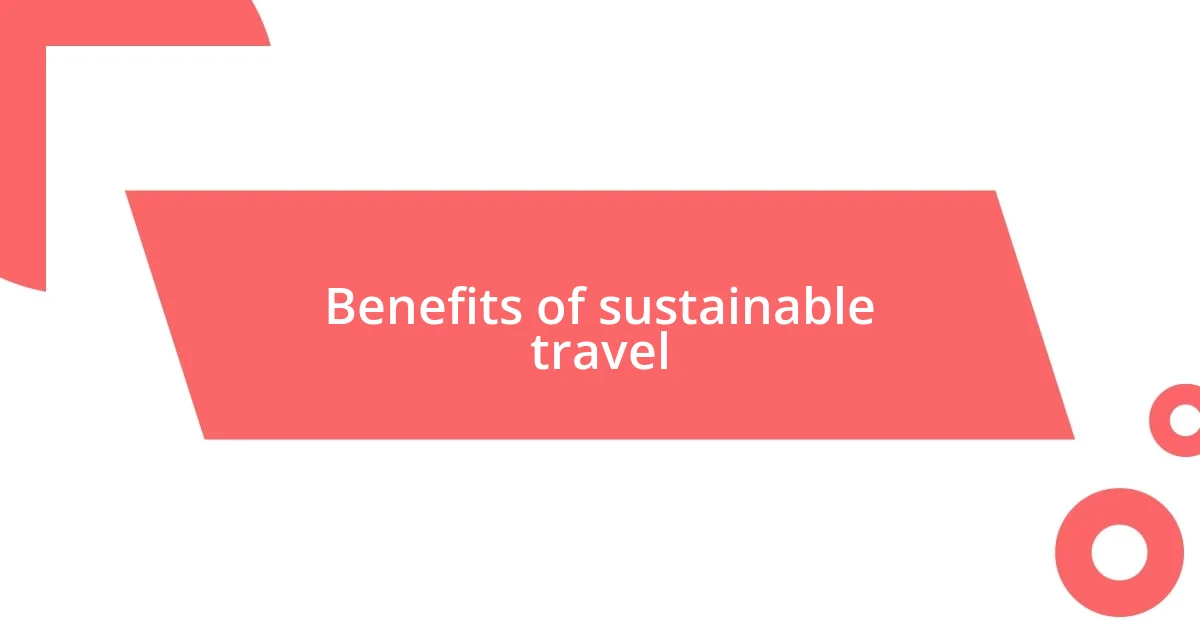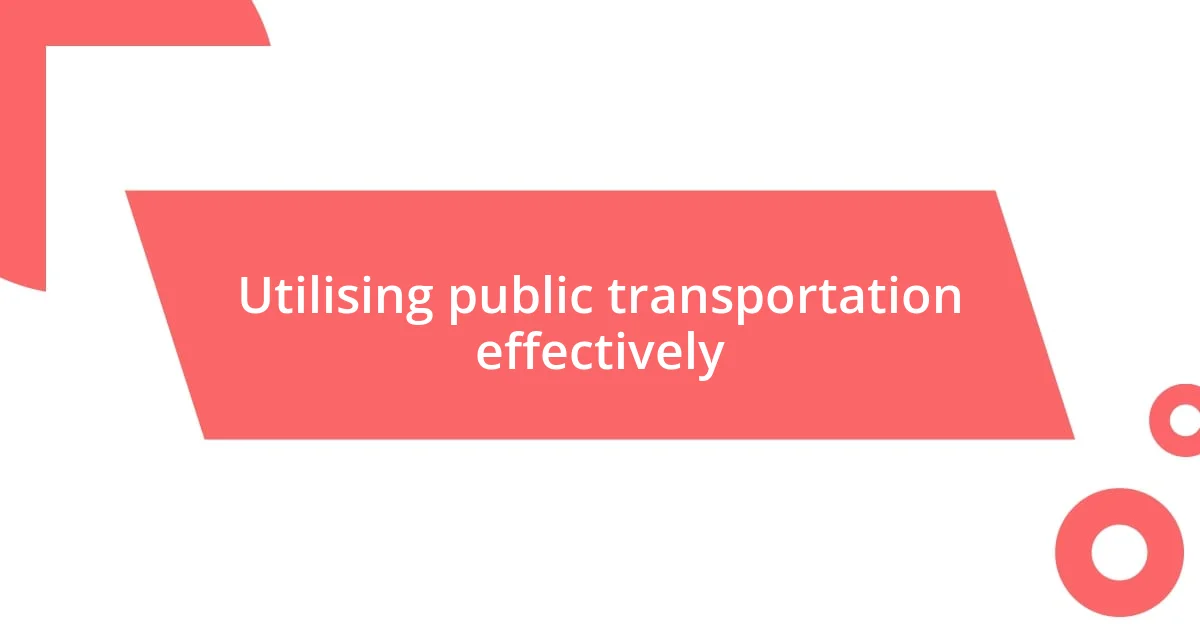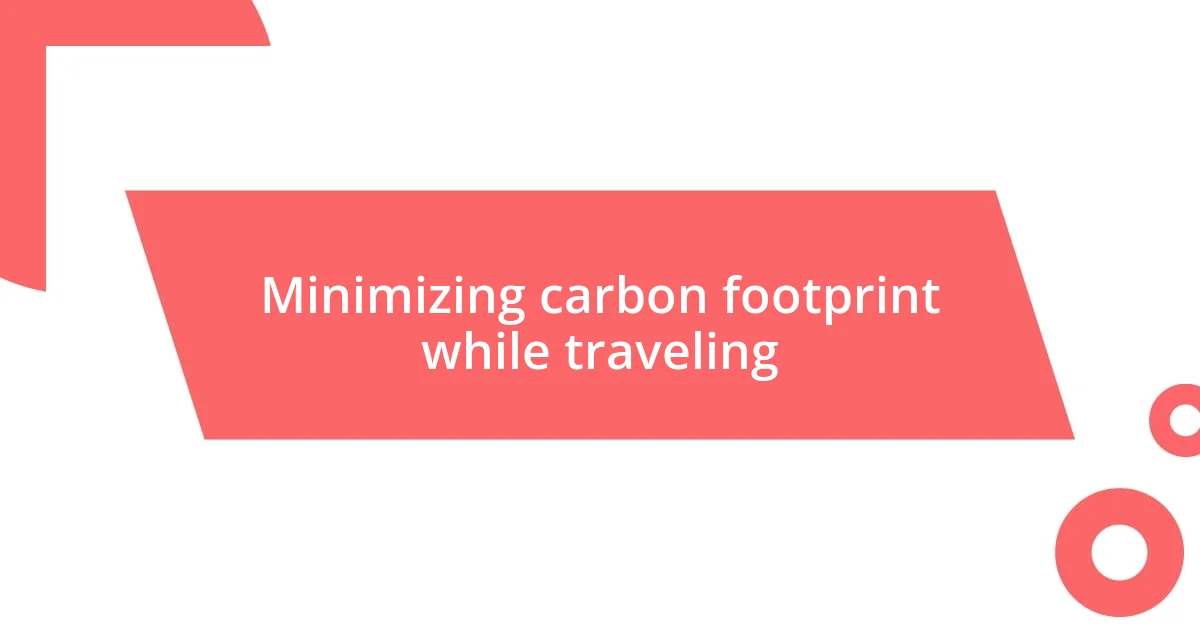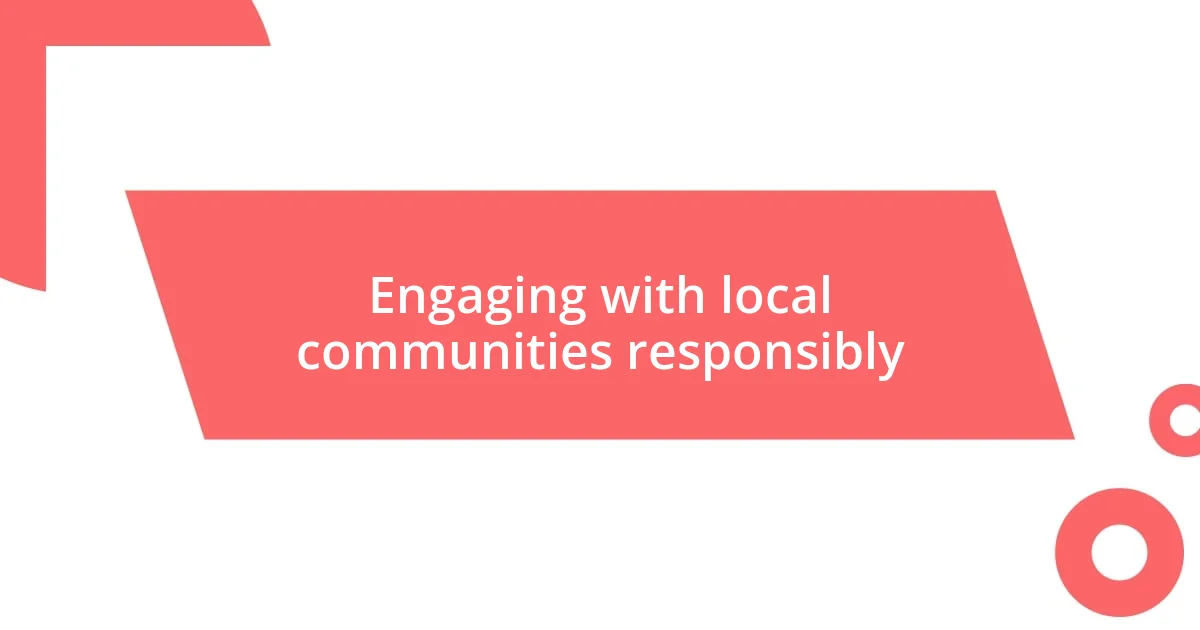Key takeaways:
- Sustainable travel enhances environmental protection, cultural enrichment, and community wellbeing, creating meaningful travel experiences.
- Choosing eco-friendly accommodations and utilizing public transportation can significantly reduce your carbon footprint and promote sustainability.
- Engaging responsibly with local communities through volunteering and respecting cultural traditions fosters deeper connections and enriches travel experiences.

Understanding sustainable travel options
Sustainable travel options encompass a range of choices aimed at reducing our environmental impact while still enjoying the wonders of exploring new places. I still remember my first trip where I carefully chose a local eco-lodge instead of a chain hotel. The experience felt different; every aspect, from the locally sourced meals to the sustainable practices, reminded me that travel could harmoniously coexist with nature.
One question that often arises is, how can your travel choices contribute to the wellbeing of local communities? During a trip to Costa Rica, I volunteered at a wildlife rescue center, and the connection I felt with the locals was profound. They shared their stories and how responsible tourism had helped their community thrive, leaving a lasting impression on me about the power of mindful travel.
Understanding sustainable travel also means being aware of your transportation choices. I had an eye-opening experience when I decided to take a train instead of flying across Europe. Not only was the scenery breathtaking, but I also found myself connecting more with fellow travelers. It made me question how often we overlook simple, eco-friendly options that can enhance our journeys beyond mere convenience.

Benefits of sustainable travel
One of the most rewarding aspects of sustainable travel is the positive impact it delivers to the environment and local communities. I recall standing amidst a lush mangrove forest during a guided eco-tour in Belize, knowing that my visit supported conservation efforts. That moment made me realize how every little choice—like opting for a tour with a focus on sustainability—can contribute to preserving such breathtaking landscapes and promoting biodiversity.
The benefits of sustainable travel are multifaceted:
– Environmental Protection: Every eco-conscious decision helps reduce pollution and conserve natural resources.
– Cultural Enrichment: Immersing yourself in local customs and traditions enhances your travel experience and fosters mutual respect.
– Community Wellbeing: Supporting local businesses ensures that tourism revenue benefits the residents directly, improving their quality of life.
– Personal Fulfillment: Engaging in responsible travel often leads to more meaningful interactions and memories, deepening your appreciation for the places you visit.
– Education and Awareness: Sustainable travel promotes awareness of global issues, like climate change, and fosters a sense of responsibility toward the planet.
I remember the warmth from a local artisan I met during a stay in a community-run homestay in Thailand. She shared her crafts and narratives, showing me the significance of preserving their traditions. The bond formed through such exchanges is a profound reminder that sustainable travel isn’t just about the destinations but also about the people we meet and the stories we carry home.

Researching eco-friendly destinations
Researching eco-friendly destinations became a passion of mine when I realized how much they contribute to conservation efforts. I often turn to resources like eco-travel blogs and forums, where fellow travelers share their experiences. One memorable moment for me was stumbling upon a small island community in the Philippines that actively protects its vibrant coral reefs. The collective effort of residents made me appreciate how tourism can become a force for good when we go off the beaten path.
As I researched destinations, I discovered various platforms that rate eco-friendly hotels and activities. I remember checking the Green Key certification, which ensures properties adhere to sustainable practices. It felt rewarding to know my choices could directly support establishments committed to environmental stewardship, just like the charming bed-and-breakfast I found in Vermont. That stay introduced me to the owner’s passion for organic farming, and we spent hours discussing ways we can all contribute to a healthier planet.
| Resource Type | Examples |
|---|---|
| Travel Blogs/Forums | EcoTraveler, Lonely Planet’s Green Travel |
| Hotel Certifications | Green Key, EarthCheck |
| Eco-Tourism Platforms | Responsible Travel, Ecotourism.org |

Choosing green accommodations
When it comes to choosing green accommodations, I wholeheartedly recommend seeking out places that prioritize sustainability. I remember booking a treehouse stay in Costa Rica that not only blended beautifully with the rainforest but also utilized solar power and rainwater collection systems. Can you imagine waking up to the sounds of nature while knowing your accommodation is treading lightly on the environment? That connection to both the land and the community enhanced my experience in ways I hadn’t expected.
I also find it valuable to look for hotels that actively engage with local initiatives. At one eco-lodge in Madagascar, the owners organized tree-planting days, inviting guests to take part. Participating in this effort created a sense of camaraderie among visitors and offered a deeper understanding of the local ecosystem’s challenges. How often do we get a chance to leave a physical mark on a place we visit? Such opportunities truly enrich our travels and contribute to lasting positive impacts.
Lastly, I strongly encourage reading reviews that highlight sustainable practices. I once selected a boutique hotel in Portugal based on glowing comments about their zero-waste philosophy. Upon arrival, I discovered they sourced food from local farmers and had an impressive recycling program in place. It was refreshing to engage in conversations with the staff about their sustainability journey, and I couldn’t help but feel proud to support an establishment with such strong values. When have you had a similar experience that made you rethink where you stay during travels?

Utilising public transportation effectively
Using public transportation effectively transformed the way I experience new cities. On my recent trip to Tokyo, I found myself navigating the intricate subway system, which was not only efficient but also a fascinating glimpse into daily life there. I remember being struck by how quiet and orderly the trains were, with everyone absorbed in their own world. It made me think: how often do we get to witness the rhythm of a culture through its public transport?
Planning ahead was key for me. I made sure to download a transit app that provided real-time updates, helping me strategize my routes and avoid any delays. There’s something exhilarating about hopping on a local bus or tram, surrounded by residents, rather than isolating myself in a taxi. Each ride became an unexpected adventure. Have you ever considered how much you can learn just by observing the interactions around you? It’s eye-opening, to say the least.
Moreover, embracing public transport can significantly reduce your carbon footprint. I recall exploring the charming streets of Amsterdam by bicycle and tram, feeling invigorated while knowing I was minimizing my impact on the environment. The sense of freedom was palpable as I pedaled past beautifully preserved architecture and vibrant local markets. It’s moments like these that remind me that sustainable travel doesn’t mean sacrificing joy; rather, it’s about discovering new ways to connect with places, people, and our shared planet.

Minimizing carbon footprint while traveling
Minimizing my carbon footprint while traveling became a delightful challenge that reshaped my journeys. During one trip to Greece, I opted to walk between towns on a stunning hiking trail instead of relying on taxis or buses. The thrill of discovering hidden coves and locally-owned taverns along the route made me wonder how many treasures I might have missed if I had chosen the easier, faster option. Have you ever considered how taking the scenic route can alter your entire travel experience?
Incorporating plant-based meals into my travel diet has also made a tangible impact on reducing carbon emissions. On a culinary adventure in India, I was amazed by the rich variety of vegetarian and vegan dishes. Savoring a warming bowl of dal while chatting with local chefs about the significance of their ingredients made me realize that food choices can support both personal health and the environment. It’s fascinating how our plates can serve as a connection to sustainability—what’s on your plate during travels telling the story of the place?
Offsetting the carbon emissions of my flights has become a thoughtful practice. Recently, I consciously chose to invest in reforestation projects after booking a long-haul trip. The idea that my contribution could help plant new trees in vulnerable ecosystems made the upcoming adventure feel more responsible. It’s empowering to know that taking small, intentional actions can lead to a greater positive impact. How can you align your travel habits with nurturing our planet? I find this reflection often sparks new ideas for my next trip.

Engaging with local communities responsibly
When I think about engaging with local communities responsibly, my mind immediately goes to the vibrant markets in Mexico City. During my visit, I sought out smaller, community-run markets rather than the more touristy spots. I remember vividly the warmth of the local vendors, who were eager to share stories about their crafts and traditions. Have you ever experienced the genuine hospitality of locals? It’s a beautiful reminder that when we choose to forge connections, we’re not just tourists; we’re part of a larger narrative.
One of my most cherished memories came from volunteering with a local organization during a trip to Costa Rica. We collaborated on a community garden project, which not only provided fresh produce but also fostered relationships among residents. The smiles and camaraderie we shared transcended cultural barriers and led to meaningful conversations about sustainability and local conservation efforts. Isn’t it amazing how a simple act of giving back can deepen your understanding of a place?
I’ve learned that being respectful of cultural traditions is paramount. On a recent journey to Bali, I found myself invited to a traditional ceremony. It was essential for me to dress appropriately and follow the customs presented by the locals. Observing how they honored their spiritual practices gave me profound insight into their way of life. It’s moments like these that challenge us to think: how can we participate meaningfully in the places we visit while preserving their unique heritage? Engaging responsibly with communities enriches the travel experience in more ways than one—it fosters respect, understanding, and lasting memories.















